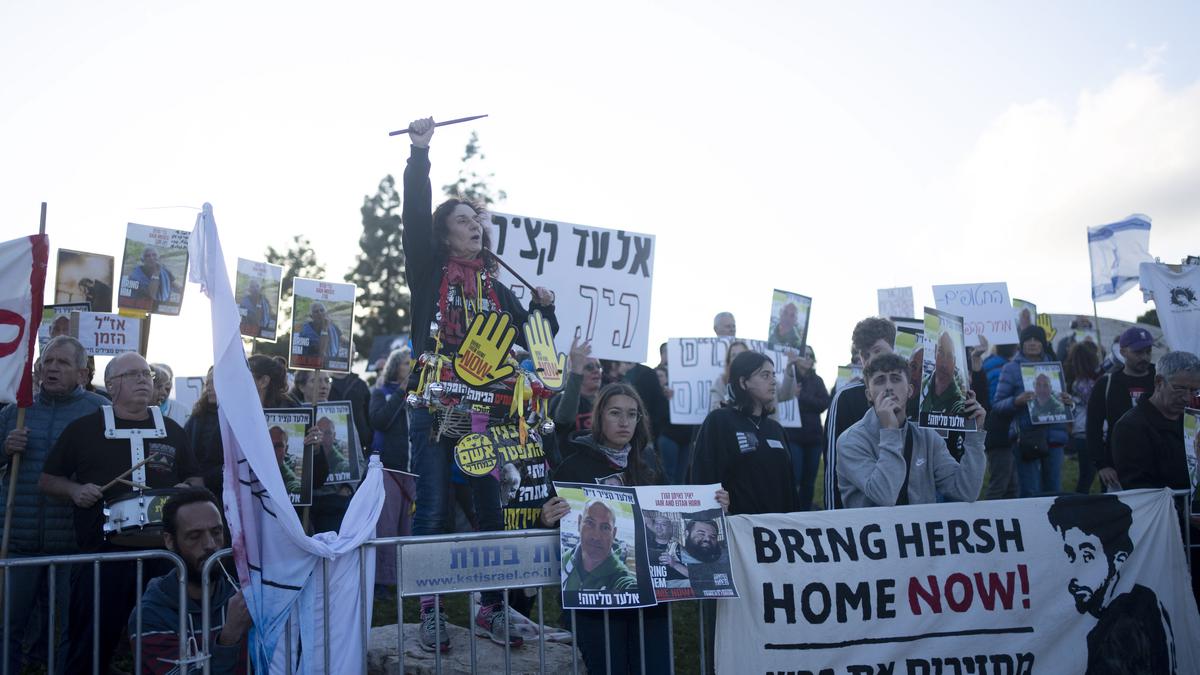
Relatives of hostages held in Gaza and their supporters protest outside of the Prime Minister’s office in Jerusalem to call for an immediate release of the captives, on Tuesday, April 9, 2024.
| Photo Credit: AP
As domestic and international pressure mounts on Prime Minister Benjamin Netanyahu to reach a deal with Hamas for truce in return for the release of hostages, a senior diplomat at the Ministry of Foreign Affairs (MFA) here said Israel’s immediate priority now is to bring the hostages back home.
“At this point we are not looking at any winning formula. We want hostages back. That’s what our urgent priority is,” said the diplomat who requested anonymity to discuss the crisis freely.
Six months of Israel-Hamas war: revisiting 10 key moments in pictures
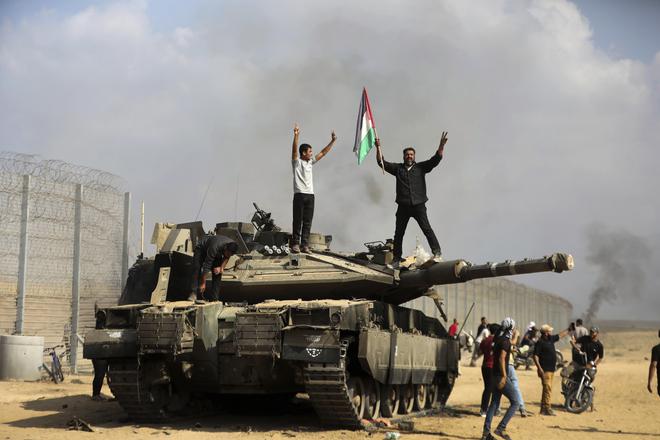
At dawn on October 7, at the end of the Jewish holiday of Sukkot, hundreds of Hamas fighters infiltrate Israel from Gaza by land, sea and air. They kill civilians in the streets, in their homes and at a desert music festival, and attack troops in army bases. They bring around 250 hostages back to Gaza, some of them now dead. Israel vows to destroy Hamas and begins bombing Gaza.
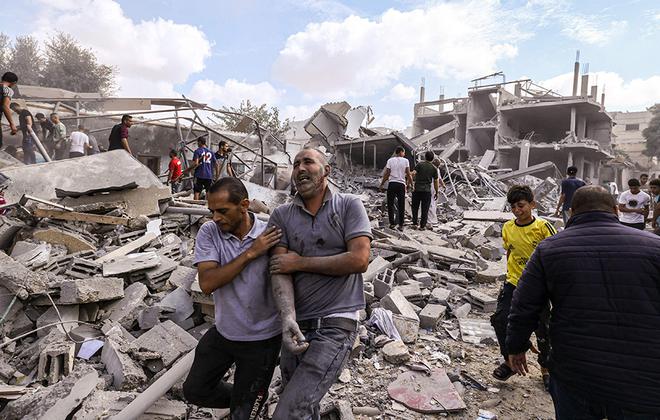
On October 13, Israel calls on civilians in northern Gaza to move south within 24 hours, declaring the north, which includes Gaza City, a war zone. Hundreds of thousands of Palestinians flee to the south of the Gaza Strip as entire districts in the north are razed to the ground.

On October 27, Israeli tanks roll into Gaza at the start of a ground offensive. The troops fight their way towards Gaza City.
On November 15, Israeli troops launch a night-time raid on Al-Shifa hospital, Gaza’s biggest medical facility where bodies had been piling up after food, fuel and anaesthetics ran out. The raid causes an international outcry. Israel claims Hamas is running a command centre below the hospital, which the armed group denies.

This satellite image provided by Maxar Technologies shows an overview Al Shifa hospital and surroundings in Gaza City on April 1, 2024. In March, Israel again targets the hospital in an intensive two-week operation that leaves hundreds dead and the complex in ruins.

On November 24, a week-long truce between Israel and Hamas negotiated in talks mediated by Qatar goes into effect. Hamas releases 80 Israeli hostages over seven days in return for 240 Palestinians held in Israeli prisons. Twenty-five other hostages, mainly Thai farm workers, are released outside of the deal.
In this photo provided by the Israeli Army, Emily Hand, a released hostage, reunites with her father on November 26, 2023, in Israel.

As part of week-long truce, Israel allows more aid into Gaza during the pause but the humanitarian situation remains dire. When the war resumes, Israel expands its actions into southern Gaza. Seen here are Palestinian children running as they flee from Israeli bombardment in Rafah in the southern Gaza Strip on November 6, 2023.
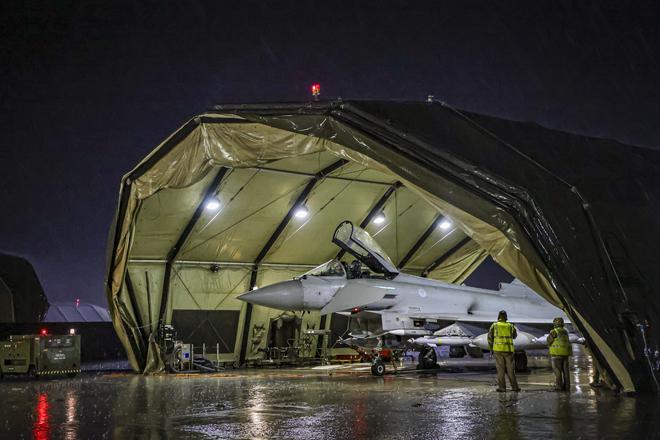
On January 12, the US and Britain launch air strikes on targets in rebel-held Yemen after weeks of attacks on Red Sea shipping by the Iran-backed Houthis acting in solidarity with Palestinians in Gaza. The strikes add to fears of a regional war.
In an interim ruling on January 26 in a case brought by South Africa, the International Court of Justice finds it “plausible” that Israel’s acts could amount to “genocide”. The world’s top court orders Israel to do “everything” to prevent any acts of genocide in Gaza but stops short of ordering a halt to the war.
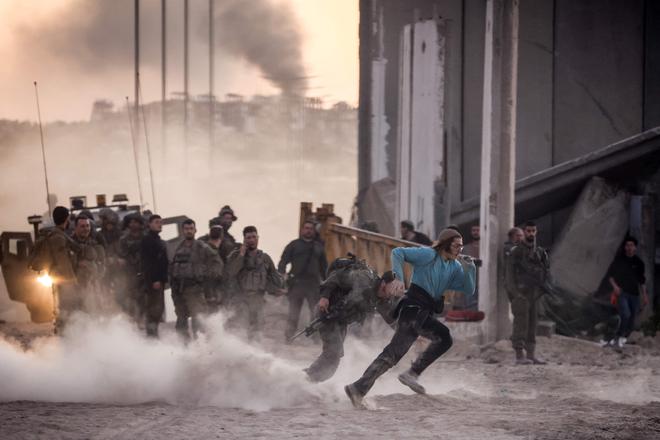
On February 29, Israeli forces open fire on desperate residents of northern Gaza who rush towards a convoy of food aid trucks, saying they believed they “posed a threat”. Gaza’s health ministry says 115 people were shot dead and hundreds wounded in what it calls a “massacre”.

At dawn on October 7, at the end of the Jewish holiday of Sukkot, hundreds of Hamas fighters infiltrate Israel from Gaza by land, sea and air. They kill civilians in the streets, in their homes and at a desert music festival, and attack troops in army bases. They bring around 250 hostages back to Gaza, some of them now dead. Israel vows to destroy Hamas and begins bombing Gaza.
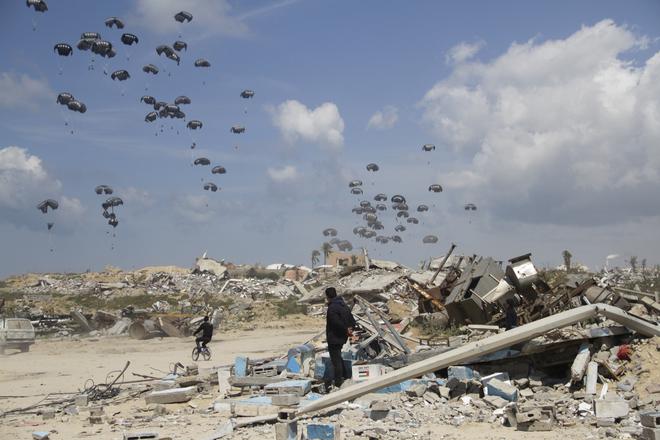
Humanitarian aid is airdropped to Palestinians over Gaza City, Gaza Strip on March 25, 2024.
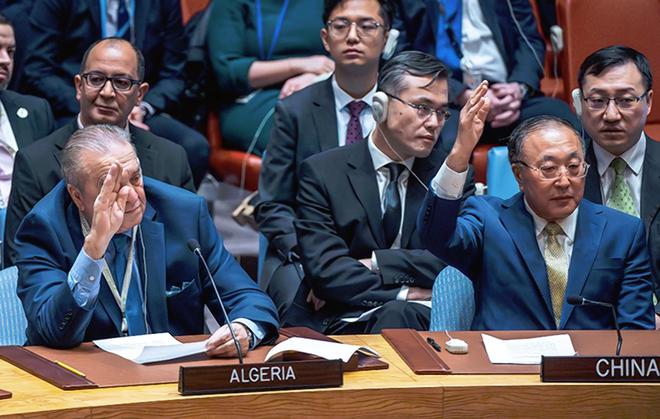
The US, Jordan and other countries begin airdropping food into Gaza. On March 15, the first food shipment along a new maritime corridor arrives in Gaza.

On April 2, seven aid workers from the US charity World Central Kitchen are killed in an Israeli strike when leaving a warehouse in central Gaza where they had just unloaded a portion of food aid from a ship. The dead are Australian, British, Palestinian, Polish and US-Canadian.
1/3
His comments came a few days after Israel withdrew all combat troops from southern Gaza’s Khan Younis and joined talks with a Hamas delegation in Cairo in the presence of Egyptian, Qatari and American officials.
The decision to pull back troops triggered criticism from Mr. Netanyahu’s far-right allies who want the Israeli Defence Forces (IDF) to go ahead with the plan to attack Rafah, the southernmost city of Gaza where over 1.4 million Palestinians, mostly refugees from the north, are camping.
But Mr. Netanyahu has played down reports that the pullback was a concession, saying he has authorised the Rafah invasion plan and has even decided a date.
Boaz Bismuth, a Member of the Knesset from Mr. Netanyahu’s ruling Likud party, echoed the Prime Minister’s sentiments. “The war in Gaza has two objectives. We have to bring back the refugees and we must win the war”.
‘How can we have a ceasefire?’
Speaking to a group of visiting journalists in a committee room at the Knesset, the Israeli Parliament, Mr. Bismuth ruled out a ceasefire in Gaza. “How can we have a ceasefire with Hamas when they are still holding hostages.”
“If we lose this war, we lose the idea of peace. If we lose, we lose everything. So, we are not going to lose it. We will fight until we win.
Asked how long the war will last, Mr. Bismuth said, “We are not asking for years like the Americans fought ISIS. In six months, our soldiers have made substantial progress in Gaza. Maybe in another six months, we could meet our goals.”
Why is the Israel- Iran shadow war escalating?
A second diplomat at the MFA, who also requested anonymity, however, did not rule out a direct link between the Khan Younis pullback and the Cairo talks.
“We are now trying to build confidence as talks move forward. We want hostages back. You can see the pullback as a measure from our side to facilitate talks. But that doesn’t mean that the war is over”, said the diplomat.
Asked if a hostage deal in Cairo would translate into a lasting ceasefire in Gaza, the first diplomat said, “I hope so. At the MFA, our focus is on the diplomatic efforts. We are open to a hostage deal and ready for tough decisions. After that I can’t guarantee what direction the war will take. I hope there would be a ceasefire. But it would depend on all lot of other factors.”
Hamas took 253 people as hostages in their October 7 attack which killed at least 1,200 people. Of the hostages, 129 are still in captivity. Some of them are believed to be dead. At least 33,000 Palestinians have been killed and over 75,000 injured in Gaza in Isarel’s offensive ever since.
Talks to resume on April 11
Talks will resume in Cairo on Thursday. After the first round on Monday, Egyptian officials had claimed progress, but Hamas and Israeli sides were ambiguous about the possibility of a deal.
According to Israeli media, Israel has demanded the release of 40 hostages in the first round. Hamas, on the other side, demands Israel’s complete withdrawal from Gaza. One IDF battalion is still in Gaza, carving out a security zone in the north.
Israel under growing pressure
Israel is under growing pressure at home to bring the hostages back. The country has seen growing protests in recent days demanding Mr. Netanyahu’s resignation over the October 7 attack and his handling of the hostage crisis.
The U.S. has also exerted pressure on Israel to announce a ceasefire and warned against an invasion of Rafah. On Tuesday, the White House welcomed Israel’s pullback from Khan Younis saying it would improve the humanitarian aid movement in Gaza and reiterated that it doesn’t support Israel’s Rafah attack plan, while President Joe Biden called for a six-to-eight weeks ceasefire.
Yossi Zilberman, deputy spokesperson of the MFA, however, said on Tuesday that the Rafah attack plan will proceed as planned.
“We are going to go to Rafah, but we are going to do it wisely. We will do it in such a way that there won’t be a humanitarian crisis as many have wanted,” said Mr. Zilberman.
(The correspondent is in Israel at an invitation from Isarel’s Ministry of Foreign Affairs.)

